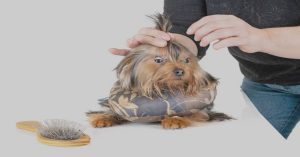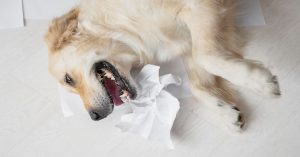Dogs should not eat Caesar dressing as it contains ingredients like oils, vinegar, and salt that are unsafe for them. Caesar dressing is high in fat and may contain toxic ingredients like garlic and onion, making it unsafe for dogs to consume.
It is essential to keep salad dressings away from dogs and stick to a diet specifically formulated for their nutritional needs. Overconsumption of Caesar dressing can lead to health concerns such as excessive saturated fat or sodium.
Moderation is vital when sharing human food with dogs, and it’s always best to consult with a veterinarian if you have any concerns about what your dog can eat.
Assessing Caesar Dressing For Dogs
Caesar dressing is unsafe for dogs as it contains oils, vinegar, and salt, which can harm canines. It’s best to keep salad dressings away from your furry friend to ensure their well-being and health.
When feeding our furry friends, we must always be cautious and mindful of what foods they can consume. One common question that arises is, can dogs eat Caesar dressing? In this article, we will assess the risks involved with human foods for canines, as well as explore the core ingredients typically found in Caesar dressing.
Risks Involved With Human Foods For Canines
Feeding human foods to dogs can often pose health risks for our beloved pets. I want to point out that some ingredients commonly found in Caesar dressing can harm dogs. Here are a few risks to consider:
- Oils: Caesar dressing usually contains oil, which can be high in fat. Excessive fat consumption can lead to pancreatitis, a painful and potentially life-threatening condition for dogs.
- Vinegar: Although vinegar is not toxic to dogs, it is highly acidic. Large quantities of vinegar can irritate a dog’s digestive system, leading to gastrointestinal upset.
- Salt: Caesar dressing often contains salt, which can be dangerous for dogs. Excessive salt intake can lead to dehydration, kidney problems, and potentially even sodium poisoning.
Core Ingredients Typically Found In Caesar Dressing
Now, let’s take a closer look at the core ingredients commonly found in Caesar dressing:
| Ingredient | Description |
|---|---|
| Romaine Lettuce | Romaine lettuce is the base of Caesar salad. While lettuce is generally safe for dogs, removing any dressing before giving it to them is essential. |
| Garlic | Some Caesar dressings may contain garlic, which can be toxic to dogs in large quantities. It is best to avoid feeding any food with garlic to your four-legged friend. |
| Anchovies | Anchovies are often used in traditional Caesar dressing for flavor. While small amounts of anchovies are generally safe for dogs, it is crucial to be mindful of seasoning and spices used in the dressing. |
It is important to remember that every dog is unique, and their tolerances may vary. Consulting with a veterinarian before introducing new food to your dog’s diet is always recommended. While Caesar dressing should generally be avoided due to its potential risks, plenty of healthier and dog-friendly alternatives are available. It is best to choose dog-safe treats and snacks formulated explicitly for their dietary needs.
Understanding Canine Nutrition
Caesar dressing is not safe for dogs to eat. The key ingredients in salad dressing, such as oils, vinegar, and salt, can harm canines. It’s best to keep Caesar dressing away from your furry friends to ensure their health and well-being.
Essential Dietary Needs Of Dogs
Dogs have specific dietary requirements that differ from humans. Providing them with a balanced diet that meets their nutritional needs is essential. Here are some key factors to consider:- Protein: Dogs require high-quality protein, aiding muscle growth, repair, and overall development.
- Carbohydrates: Unlike humans, dogs do not have a nutritional requirement for carbohydrates. However, they can derive energy from carbohydrates in moderate amounts.
- Fats: Fats are essential for dogs as they provide energy, support healthy skin and coat, and aid in absorbing fat-soluble vitamins.
- Vitamins and Minerals: Dogs need a variety of vitamins and minerals to support their overall health. These include vitamins A, D, E and B-complex vitamins and minerals like calcium, phosphorus, and iron.
- Water: Adequate hydration is crucial for dogs. Make sure your furry companion always has access to fresh and clean water.
Comparison With Human Dietary Requirements
It is important to note that human dietary requirements and dog dietary requirements are not the same. While some foods may be safe for human consumption, they can be harmful or toxic to dogs. That brings us to the question: can dogs eat Caesar dressing? Caesar dressing, commonly used in salads, can pose potential risks to dogs. The key ingredients in Caesar dressing, such as oils, vinegar, and salt, are not ideal for canine consumption.Analyzing Caesar Dressing Ingredients
When feeding your furry friend, it’s essential to understand which human foods are safe. Caesar dressing is a famous salad dressing that many pet owners may wonder about. This section will analyze the ingredients commonly found in Caesar dressing and explore the potential health implications for dogs.
Common Ingredients Listed In Caesar Dressing
Caesar dressing typically contains ingredients that give it its unique flavor. Some common ingredients in Caesar dressing include:
- Romaine lettuce
- Olive oil
- Parmesan cheese
- Lemon juice
- Garlic
- Worcestershire sauce
- Black pepper
- Mustard
It’s important to note that different brands and recipes may have slight variations in their ingredient lists. Please always read the label or check the recipe to know precisely what is in the dressing.
Potential Health Implications For Dogs
While some of the ingredients in Caesar dressing may be safe for dogs, specific components can pose potential health risks:
- Lemon juice: Lemon juice is acidic and can cause digestive upset in dogs if consumed in large amounts. While a small amount of lemon juice is unlikely to cause harm, it’s best to avoid feeding dogs foods that contain excessive lemon juice.
- Garlic: Garlic is toxic to dogs and can cause anemia and other serious health issues. Even though the amount of garlic in Caesar dressing is typically small, it’s best to err on caution and avoid feeding it to your canine companion.
- Salt: Caesar dressing often contains a significant amount of salt, which can harm dogs when consumed excessively. Excessive salt intake can lead to dehydration, electrolyte imbalances, and other health problems. It’s best to avoid feeding Caesar dressing to your dog to prevent salt-related issues.
While some ingredients in Caesar dressing may be safe for dogs in small quantities, it’s always recommended to consult your veterinarian before introducing any new food into your dog’s diet. They can provide guidance specific to your dog’s needs and ensure their overall well-being.
Can Dogs Eat Caesar Dressing Safely
Caesar dressing is not safe for dogs to eat due to its high-fat content and ingredients like anchovies that are harmful to them. It is best to keep salad dressings away from canines and stick to a diet suitable for their nutritional needs.
Analysis Of Caesar Dressing Components And Canine Health
Caesar dressing is a delicious addition to salads, but can dogs eat it safely? Let’s break down the components of Caesar dressing and their potential effects on canine health.
Oils: Most Caesar dressings contain oils such as olive oil or vegetable oil. While these oils are generally safe for dogs in small quantities, they can be high in fat and lead to weight gain and digestive issues if consumed in excess.
Vinegar: Caesar dressing often includes vinegar, which is generally safe for dogs. Some dogs even enjoy the tangy taste of vinegar. However, excessive consumption can irritate the stomach lining, so it’s best to offer Caesar dressing to your furry friend in moderation.
Salt: Salt is a common ingredient in Caesar dressing, and while a small amount is necessary for a balanced diet, excessive consumption can lead to salt poisoning in dogs. Symptoms of salt poisoning include vomiting, diarrhea, excessive thirst, and even seizures. Therefore, keeping Caesar dressing and other salty foods away from your canine companion is essential.
Garlic: Some Caesar dressings contain garlic, which can be toxic to dogs in large quantities. However, garlic in Caesar dressing is typically low, so a slight taste or accidental ingestion is unlikely to cause harm. Nevertheless, it’s best to avoid feeding your dog large amounts of Caesar dressing containing garlic.
Situations Where Caesar Dressing Could Harm Dogs
While small amounts of Caesar dressing may not pose an immediate threat to your dog’s health, there are situations where it could be harmful:
- If your dog has a pre-existing medical condition such as pancreatitis or obesity, the high-fat content in Caesar dressing can worsen these conditions.
- Feeding your dog large amounts of Caesar dressing regularly can lead to weight gain, adversely affecting their overall health and well-being.
- Dogs with known sensitivities or allergies to any components in Caesar dressing should avoid consuming it altogether to prevent adverse reactions.
It’s important to remember that while a small taste of Caesar dressing occasionally may not harm your dog, it’s always best to consult your veterinarian before introducing any new food into your dog’s diet. Your vet can provide personalized advice based on your dog’s specific needs and health condition.
The Garlic And Onion Debate
When feeding our furry friends, we must know the foods that can harm them. One debate among dog owners is whether or not garlic and onions are safe for dogs to consume. Garlic and onions are staples in many kitchens and are often found in various dishes, including Caesar dressing.
Toxicity Of Garlic And Onions For Dogs
Garlic and onions belong to the Allium family and contain compounds that can be toxic to dogs. These compounds, known as thiosulphates, can cause damage to a dog’s red blood cells, leading to hemolytic anemia. Symptoms of garlic and onion toxicity in dogs may include weakness, vomiting, diarrhea, and pale gums.
Presence Of These Ingredients In Caesar Dressing
Caesar dressing, a popular condiment, often contains garlic and onions as crucial ingredients. While the amounts of these ingredients may be relatively small, it’s essential to remember that even small doses over time can have a cumulative effect on a dog’s health. If your dog ingests a large amount of Caesar dressing, it is crucial to monitor them for any signs of garlic and onion toxicity and seek veterinary care if necessary.
In addition to the potential harm caused by garlic and onions, it’s important to note that Caesar dressing may contain other ingredients that could harm dogs. These include high levels of sodium, which can lead to dehydration and kidney issues, as well as artificial additives and preservatives that can cause digestive upset. If you want to include your dog in your culinary adventures, it’s always best to stick to dog-friendly ingredients and avoid sharing foods that may contain potentially harmful ingredients. Your dog’s health and well-being should always be a top priority, so it’s best to err on the side of caution when it comes to the garlic and onion debate and avoid feeding them Caesar dressing.
The Danger Of Anchovies In Dressing
Caesar dressing can be dangerous for dogs due to anchovies and high-fat content. It’s best to avoid feeding your furry friend any salad dressing to keep them safe and healthy.
Anchovy Content In Caesar Dressing And Dog Health
Lovers of Caesar salad know that the rich and creamy dressing brings the flavors together. However, please know this when sharing this dress with our beloved furry friends. One of the main ingredients that make up traditional Caesar dressing is anchovies. While it may not seem harmful to us, this small fish poses potential dangers to our canine companions.
Salt And Oil Content Concerns
Anchovy content in Caesar dressing and dog health should be a cause for concern as it brings many potential issues. Anchovies are known for their high salt content, and excessive sodium intake can lead to health problems in dogs. Dogs are more sensitive to salt than humans, and consuming foods with high salt levels can cause dehydration, electrolyte imbalances, and even kidney issues. Besides the salt concern,
Caesar dressing also contains significant amounts of oil. While some oils, like olive oil, can benefit dogs’ coats and overall health in moderation, the oils found in Caesar dressing are often high in unhealthy fats. These fats can contribute to weight gain, pancreatitis, and other digestive issues. If your dog ingests Caesar dressing containing anchovies, monitoring their behavior for any signs of discomfort or illness is crucial. Symptoms like vomiting, diarrhea, excessive thirst, or lethargy should be taken seriously and may require veterinary attention.
Exploring Dressing Alternatives
While Caesar dressing may be a tasty addition to our salads, it’s important to remember that not all human foods are safe for our furry friends. Caesar dressing, in particular, is a no-no for dogs due to its high content of oils, vinegar, and salt. These ingredients can cause digestive issues and even lead to sodium poisoning in dogs. However, there are plenty of healthy and safe alternatives that you can explore to enhance your dog’s meals without any harm. This article will discuss some healthy and dog-safe alternatives to Caesar dressing and provide some do-it-yourself (DIY) dressing recipes you can whip up in no time.
Healthy And Safe Alternatives To Caesar Dressing For Dogs
If you’re looking to add some flavor to your dog’s meals without resorting to Caesar dressing, there are plenty of healthy and dog-safe alternatives that you can consider. These alternatives not only provide a tasty twist to your dog’s meals but also offer nutritional benefits:
- Plain Yogurt: Plain, unflavored yogurt is an excellent alternative to Caesar dressing. It is low in fat and contains probiotics that promote a healthy dog gut.
- Mashed Pumpkin: Mashed pumpkin is not only tasty but also high in fiber and rich in vitamins. It can add a natural sweetness to your dog’s meals.
- Applesauce: Unsweetened applesauce is a dog-friendly alternative that can add a touch of sweetness to your dog’s meals. However, check for added sugars or artificial sweeteners, as these can harm dogs.
- Coconut Oil: Coconut oil is a healthy and dog-safe option that can enhance the flavor of your dog’s meals. It is rich in medium-chain fatty acids that benefit dogs’ overall health.
- Vegetable Broth: Homemade vegetable broth is a flavorful option that can be added to your dog’s meals. It adds moisture and taste without the harmful ingredients found in Caesar dressing.
Diy Dog-safe Dressing Recipes
If you prefer to make your dressing for your canine companion, here are some simple and dog-safe recipes that you can try:
- Yogurt and Parsley Dressing
Mix plain yogurt with finely chopped fresh parsley. This dressing adds a refreshing flavor and helps freshen your dog’s breath.
- Pumpkin and Cinnamon Dressing
Combine mashed pumpkin with a sprinkle of cinnamon. This dressing adds a touch of sweetness and provides antioxidants and anti-inflammatory benefits.
- Apple and Ginger Dressing
Mix unsweetened applesauce with a small amount of grated ginger. This dressing not only adds a zingy flavor but also aids in digestion and supports a healthy immune system. Remember to introduce any new food or dressing gradually and in moderation. Every dog is unique, and it is essential to monitor their reactions to ensure no adverse effects. By exploring these healthy and safe alternatives, you can add variety and flavor to your dog’s meals without compromising their well-being.
Preventing Dietary Mishaps
Diet plays a crucial role in maintaining the health and well-being of our furry friends. As pet owners, we are responsible for ensuring that our dogs have a nutritionally balanced diet and are protected from harmful foods. Unfortunately, sometimes, we may inadvertently expose our dogs to potential dietary mishaps. This section will discuss essential tips for avoiding harmful dog foods and guidelines for treating food-related emergencies.
Tips For Avoiding Harmful Foods For Dogs
- Be mindful of certain human foods that can be toxic to dogs.
Numerous human foods, including chocolate, onions, garlic, grapes, and raisins, can harm dogs. These foods can cause serious health issues, ranging from digestive problems to organ failure. You must familiarize yourself with the list of dangerous dog foods and keep them out of their reach.
- Avoid feeding your dog fatty or greasy foods.
Foods such as bacon, sausage, and fried items can be tempting to share with our dogs. However, these foods are typically high in fat, which can lead to pancreatitis and other digestive issues. Sticking to a well-balanced and appropriate diet for your dog is best.
- Keep toxic substances locked away.
Certain household items, such as medications, cleaning chemicals, and plants, can be toxic to dogs if ingested. Make sure these items are stored securely to prevent accidental ingestion and poisoning. Contact your veterinarian immediately if your dog has ingested a toxic substance.
Guidelines For Treating Food-related Emergencies In Dogs
| SymptomsAction: Vomiting, diarrhea, or signs of distress. Contact | Please be sure to |
|---|---|
| ask your veterinarian for guidance, especially if the symptoms persist or worsen. | |
| Choking or difficulty breathing | m, the Heimlich maneuver for dogs, or seek immediate veterinary assistance. |
| Allergic reaction (e.g., swelling, difficulty breathing): | Administer antihistamines if you want to have a veterinarian and seek immediate veterinary care. |
| Seizures or loss of consciousness | Seek emergency veterinary care immediately. Please don’t try to handle this situation on your own. |
Remember that every food-related emergency requires individual attention, and contacting your veterinarian should always be your first step. The information provided in this section serves as a general guide. Your veterinarian can give you the best advice based on the circumstances. By following these tips for avoiding harmful foods and being prepared for food-related emergencies, you can keep your canine companion safe and well-nourished. Remember, prevention is critical when it comes to your dog’s diet.
Frequently Asked Questions
Can Dogs Eat Salad Dressing?
No, dogs should not eat salad dressing as it is unsafe. The ingredients in salad dressing, such as oils, vinegar, and salt, are unsuitable for dogs. It is best to keep these away from your canine companion.
Is It Safe To Eat Caesar Salad Dressing?
No, it is unsafe to eat Caesar salad dressing as it contains ingredients unsuitable for dogs, such as oils, vinegar, and salt. These can be harmful to their health. It’s best to keep salad dressing away from canines.
Is All Caesar Dressing Pasteurized?
Yes, commercially prepared Caesar dressing is usually pasteurized, making it safe to consume.
Can Dogs Eat Romaine Lettuce?
No, dogs should not eat romaine lettuce. Keeping lettuce away from dogs is best as it can cause digestive issues.
Can Dogs Safely Eat Caesar Dressing?
Caesar dressing is unsafe for dogs due to its high-fat content and ingredients like garlic and anchovies, which can be toxic to dogs.
Conclusion
To keep your furry friend safe, it’s best to avoid feeding them Caesar dressing. The key ingredients in this dressing, such as oils, vinegar, and salt, can harm dogs. While small amounts might not cause immediate harm, preventing them from consuming it regularly is essential.
Remember, it’s always best to consult your veterinarian about your dog’s diet and any specific concerns. Keep your pup healthy and happy by sticking to dog-friendly food options.







